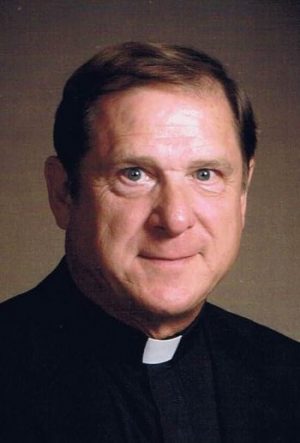Palm Sunday: We are to give glory and praise to God even as we carry our cross

Father Michael Schaab
Palm Sunday of the Lord’s Passion/April 14
(At the procession with palms)
Luke 19:28-40
(At the Mass)
Isaiah 50:4-7; Psalm 22:8-9,17-18,19-20,23-24; Philippians 2:6-11; Luke 22:14 — 23:56
There are two Gospels this Sunday. The first is from Luke and is part of the Procession With Palms. As with all familiar Scripture readings, it is easy to miss some of the lessons they hold. For instance, twice in this Gospel we read the line, “The Master has need of it.” Whenever a line is repeated like this the author is emphasizing something. While in the account of the Procession, this line is in response to the question, “Why are you untying this colt?” Luke uses the line to call for our response to the question, “What does the Lord need from you to bring his Good News into our world?”
The idea of proclaiming this Good News that Christ has come to establish the Kingdom of God is central to the readings today that lead up to the Passion. The multitude of his disciples on that first Palm Sunday cry out, “Peace in heaven and glory in the highest.” Their words echo those of the angels, “Glory to God in the highest and on earth peace,” and of the shepherds who “returned glorifying and praising God,” which are part of the Christmas account in the beginning of Luke’s Gospel. Again we are left with a question, “The angels, the shepherds and the disciples all proclaimed the Good News; what am I doing to proclaim it?”
And to emphasize this point even more, the first Gospel today ends with the Pharisees demanding that Jesus silence his disciples: “Teacher, rebuke your disciples.” But Jesus makes it very clear that this is exactly what they must do as his followers for this is what he did as the Messiah — he proclaimed the Good News.
SUFFERING — WITH TRUST
The first reading of the Mass picks up on this theme of proclamation with a reading from Isaiah. The words of the prophet are, “The Lord has given me a well-trained tongue, that I might know how to speak to the weary.” Jesus fulfilled these words and calls his disciples then and now to do the same. All of this is meant as preparation for the Passion in which Jesus is treated just as the prophets before him had been treated. Furthermore, as prophets down through the ages, the followers of Jesus are called to take up their cross.
The responsorial psalm for this Mass explains to us how and why we are to carry the cross. The response, “My God, my God, why have you abandoned me?” are Jesus’ own words as he hung on the cross, but they are also from Psalm 22, the Psalm used in today’s responsorial. Taken in the context of his agony on the cross, these words seem to express despair. However, taken as part of the psalmist’s prayer which Jesus was reciting, they express not only the agony of his suffering but also his hope and trust in God even in the midst of his suffering. This is what all the prophets did before him, and this is what he calls his disciples to as he comes to the end of his mission on earth.
The final stanza of the responsorial psalm is so important because it stands almost as a rejection of that response that we have repeated five times today. Rather than being abandoned by God, Jesus prayed, “I will proclaim your name to my brethren; in the midst of the assembly I will praise you: You who fear the Lord praise him; all you descendants of Jacob, give glory to him; revere him, all you descendants of Israel!” Once again, the proclamation of the prophets is emphasized and held up as a model for all disciples to follow. We are to give glory and praise to God even as we carry our cross.
CONTRADICTION OF THE CROSS
The Scripture preparing us for the reading of the Passion comes from the Letter to the Philippians, and it expresses the utter contradiction of the cross. Christ Jesus emptied himself and God greatly exalted him. Again though, it’s important not to let these words apply only to Christ. The line in the Letter that precedes today’s reading says it all: “Your attitude must be Christ’s.”
The Passion calls not only Christ but also each of us to empty ourselves and to allow God to truly exalt us.
A final thought: after the reading of the Passion the presider is instructed to either give a brief homily or to allow for a time of silence for the assembly to personally reflect on what has been proclaimed. Whether we are given quiet time for reflection in the liturgical celebration or we take it at home, this overwhelming feast demands our prayerful time and attention.
—
Father R. Michael Schaab is a senior priest of the Diocese of Peoria who gives retreats and days of recollection, and fills in as presider at parish Masses on weekends. He resides on a hobby farm in Putnam County.





